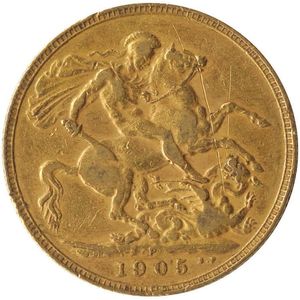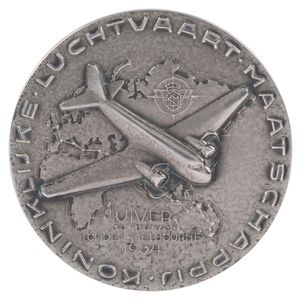MacROBERTSON Centenary Air Race Silver Medal for 'Uiver' (1934)
The London to Melbourne, MacROBERTSON Centenary air race 1934, silver medal created to honour the winning entry, the 'Uiver', 50 mm diameter and depicting the aeroplane, a Klm Douglas DC2 in flight over a map depicting the route (obverse) and with the names of the crew on the reverse. Quite common in bronze, this is the first example we have seen in silver., Winner of the handicap division, and second fastest with an airtime of 81 hours 10 minutes, was the Dutch airliner Uiver (stork). Crewed by Parmentier, Moll, Prins and van Brugge and carrying three passengers, the Douglas DC2 was entered by Klm airlines and showed that passenger air travel could be comfortable, safe and reliable. Uiver suffered a near disaster when the crew became lost in a storm over Albury, NSW. Residents, alerted by the local radio announcer, scrambled to bring their cars to the racecourse where rows of headlights guided the plane down to land. The next day it had to be dragged out of the mud to continue in the race to Melbourne.
You must be a subscriber, and be logged in to view price and dealer details.
Subscribe Now to view actual auction price for this item
When you subscribe, you have the option of setting the currency in which to display prices to $Au, $US, $NZ or Stg.
This item has been sold, and the description, image and price are for reference purposes only.
- Obverse - Obverse means the front face of a coin or medal, and the reverse means the back face. The obverse of a coin is commonly called heads, because it often depicts the head of a monarch or famous person.
- Bronze - An alloy of copper and tin, traditionally in the proportions of about 9 parts of copper to 1 part of tin.
The discovery of bronze in Western Asia in the 4th century enabled people to create metal objects which were superior to those previoulsy possible because of its strength and hardness, and it has been used throughout the world for weapons, coins, tools, statuary and other decorative items.
It is very fluid in a molten state, and its hardness, strength when set, and non-corrosive properties makes it most suitable for casting sculpture.
This item has been included into following indexes:
- MacRoberston London to Melbourne air race, 1934 - commemorative wares 7
- medals and medallions
Visually similar items

1910P, KEVII sovereign with Perth mint mark
Sold by
in
for
You can display prices in $Au, $US, $NZ or Stg.

1905P, KEVII sovereign with Perth mintmark
Sold by
in
for
You can display prices in $Au, $US, $NZ or Stg.

An early 20th century Scottish silver Celtic brooch, circular form with Celtic knot relief cast decoration. Glasgow 1913 by Alexander Ritchie.
Sold by
in
for
You can display prices in $Au, $US, $NZ or Stg.

George V 1925 gold full sovereign Sydney mint, St George reverse.
Sold by
in
for
You can display prices in $Au, $US, $NZ or Stg.
